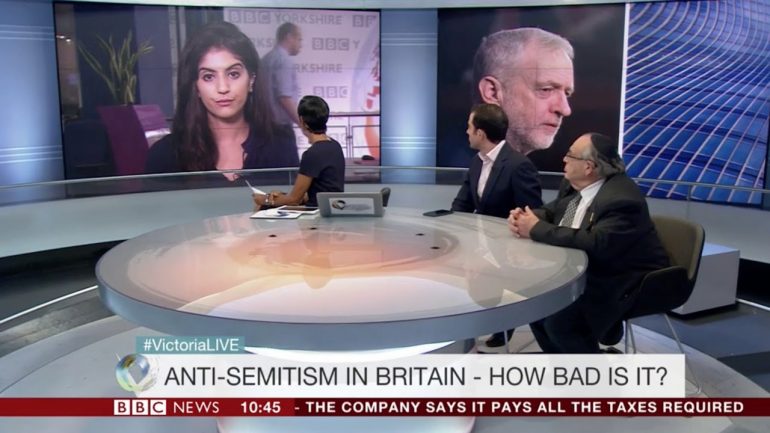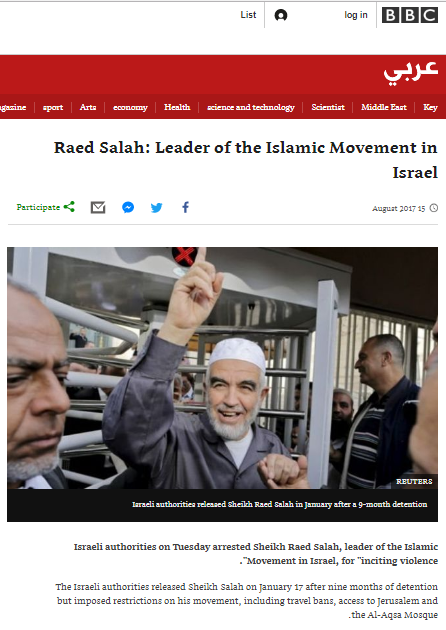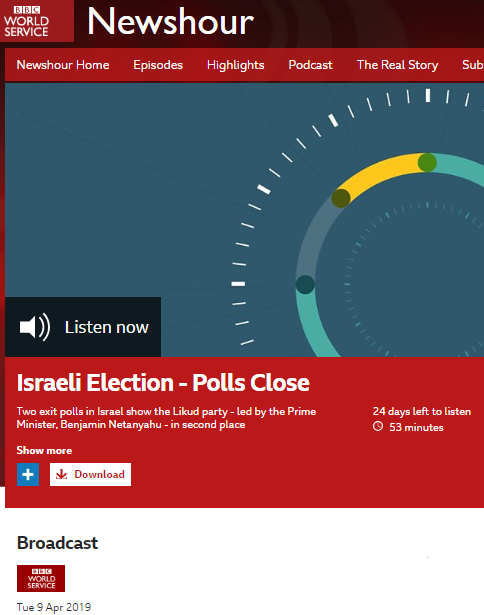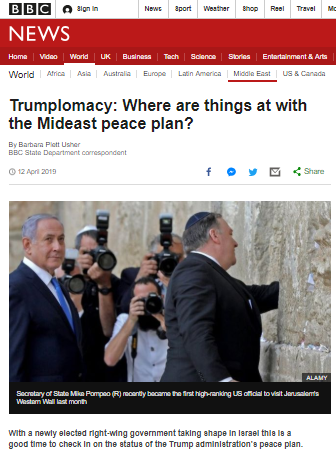The August 3rd edition of the BBC Two television programme ‘Victoria Derbyshire’ included an item concerning what presenter Reeta Chakrabarti euphemistically described as “the problems in the Labour Party”.
Although The BBC has been covering that topic with varying degrees of accuracy and impartiality for well over two years, it was presented to viewers as something that has recently come to light. [emphasis in italics in the original]
Chakrabarti: “It’s been widely assumed that all forms of racism exist within the far right of politics but it’s now being suggested that the Left has issues with antisemitism too. Where has that come from?”
In her second question to guest journalist Jonathan Sacerdoti, Chakrabarti said:
Chakrabarti: “Well I wonder if we can broaden this out a little bit from the Labour party to the sort of ideas of antisemitism – quite where they come from – because there’s often quite a conflation of antisemitism with anti-Zionism, isn’t there? Can you explain just quite simply what the difference is?”
As Sacerdoti spoke about Jewish self-determination in Israel, viewers were shown a very interesting selection of images, none of which reflected the content of his reply.
Chakrabarti then brought in another guest – Katy Sian – previously identified as “a sociology lecturer at York University specialising in racism”.
According to York University Ms Sian’s field of interest does not include antisemitism.
“The main thrust of her scholarship is focused on critical race theory and the performance of postcolonial subjectivity among ethnically marked communities stranded in metropolitan archipelagos. The initial iteration of her research can be seen in her first monograph, Unsettling Sikh and Muslim Conflict: Mistaken Identities, Forced Conversions, and Postcolonial Formations. This book has generated much debate with its pioneering mapping of Sikh-Muslim antagonism as it circulates throughout Britain. Katy is expanding this research by investigating Sikh-Muslim conflict in the USA and Canada where little work exists.”
Chakrabarti went on:
Chakrabarti: “[…] You study racism; that’s your…part of your profession. How big an issue do you think that antisemitism is within the whole spectrum of hate politics across the UK?”
Viewers heard that antisemitism “isn’t as bad as has been made out”, that it is “remarkable” that other forms of racism are not being discussed in the same way and that Katy Sian does not “think it’s right to just exceptionalise one form of racism over another”.
Chakrabarti then asked:
Chakrabarti: “…I wonder then why you think antisemitism gets so much air-time?”
Clearly one answer to that question would be that Labour Party members are not promoting Romaphobia, Islamophobia or anti-Black racism on social media or in local council meetings but the ‘expert’ answer viewers heard was as follows:
Sian: “I think it gets so much air-time because of Corbyn and his historic kind of…ehm…support for Palestinian rights. So it’s part of a much wider political project which is to essentially silence any critique of the Israeli state expansion.”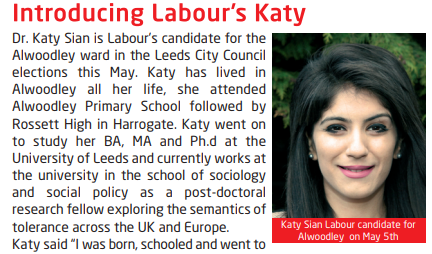
Leaving aside the question of what those three last words are supposed to mean (seeing as Israel has only withdrawn from territory throughout the last fifty years), it would of course have been appropriate – according to BBC editorial guidelines on impartiality which stipulate the “need to make it clear to the audience when contributors are associated with a particular viewpoint” – for viewers to have been informed that Katy Sian stood on behalf of the Labour Party in a district of Leeds during local council elections in 2011.
Moreover, seeing as the programme’s producer arranged her appearance via Twitter, one presumes that he was aware of the fact that Sian’s feed shows that she has not changed her political affiliations since then and that she regularly Tweets anti-Israel material.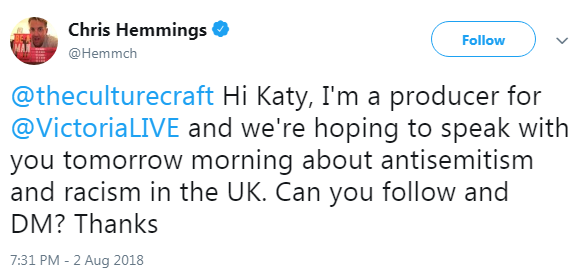
At that point in the show, Chakrabarti read a statement from the Labour Party before bringing guest Geoffrey Alderman to speak about the historic aspect of antisemitism in the UK. When Professor Alderman said that he thought it “outrageous” to suggest that those objecting to antisemitism in the Labour Party were doing so because they wanted to “get rid” of Jeremy Corbyn or “to do down the Labour Party”, she jumped in:
Chakrabarti: “Well I wanted to ask if it also has something to do with the actions of the Israeli government.”
Less than a minute later she asked Jonathan Sacerdoti: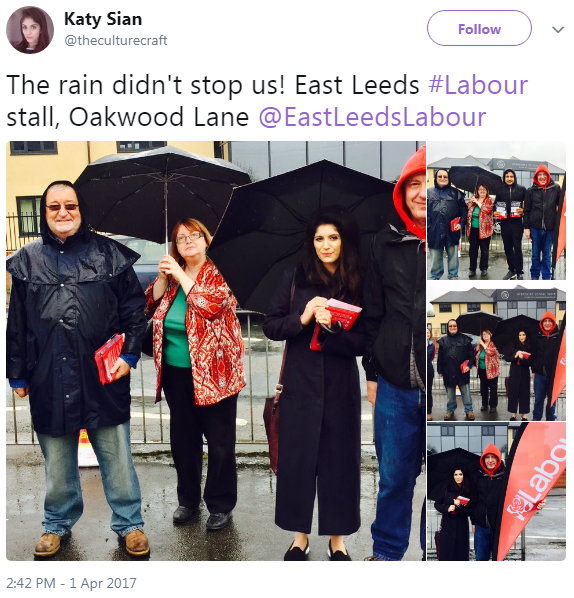
Chakrabarti: “Do you not accept that for some people it’s the actions of the Israeli government they are protesting against?”
She subsequently claimed that Sacerdoti was misrepresenting Sian’s statement concerning “a wider political project” before going on to give her “a final right of reply”.
Sian: “I mean I would argue that bigotry, violence, harassment, abuse, hatred and systematic oppression enshrined through laws and policies directed at Jews for simply being Jews is antisemitic. To critique Israel’s settler colonial state is not antisemitic.”
Chakrabarti made no effort to challenge Sian’s false and materially misleading portrayal of Israel as a “settler colonial state”, instead allowing her to read out loud from an obviously pre-prepared statement on India which had nothing to do with the issue of antisemitism in Britain’s Labour Party.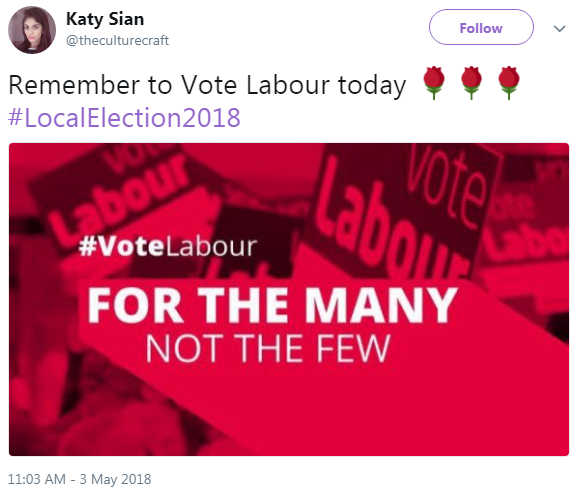
The fact that a Jeremy Corbyn and Labour Party supporter – and quite possibly a party member – was brought in to comment on this topic while inadequately presented as a ‘neutral’ academic is clearly a breach of BBC editorial guidelines on impartiality.
The fact that audiences were also not informed that the same supposedly ‘neutral’ academic regularly promotes anti-Israel material and four years ago had a book launch organised by the (Corbyn favoured) Iran linked, self-styled Islamic Human Rights Commission (IHRC) – which organises the annual anti-Israel ‘Quds Day’ hate rally in London – likewise clearly impairs their ability to put her claims and pronunciations into their appropriate perspective.
Resources:

